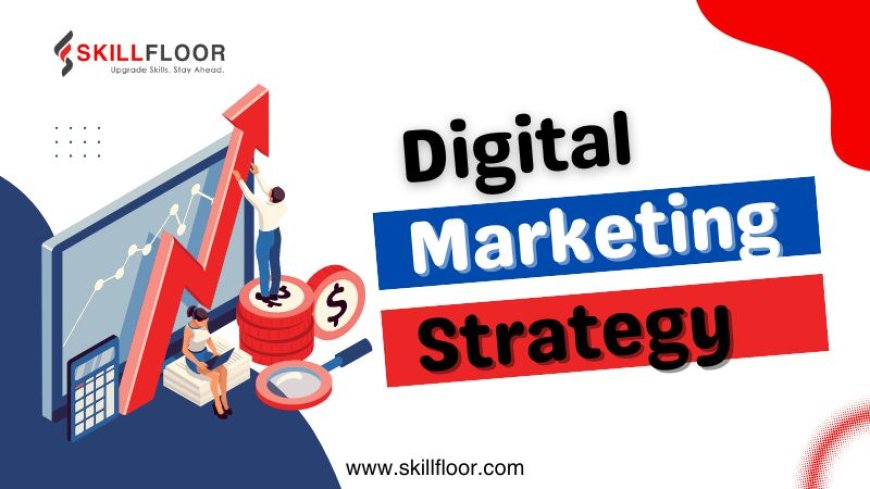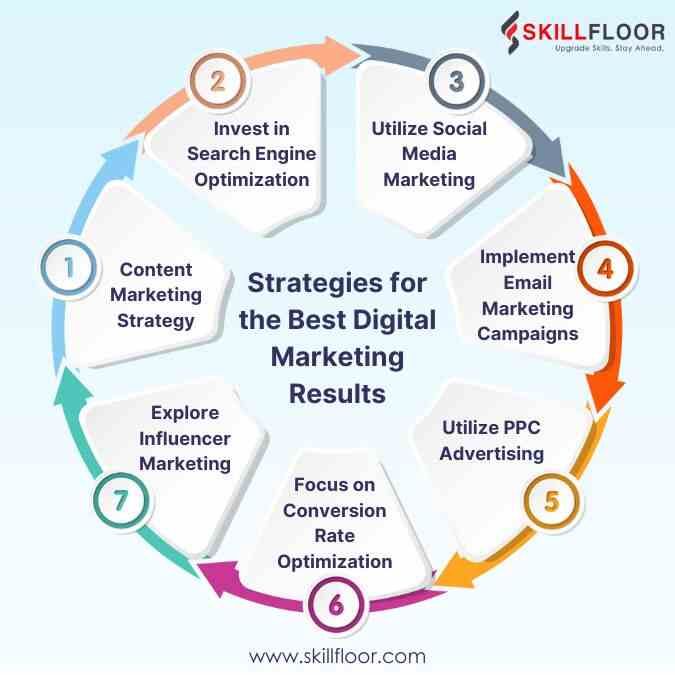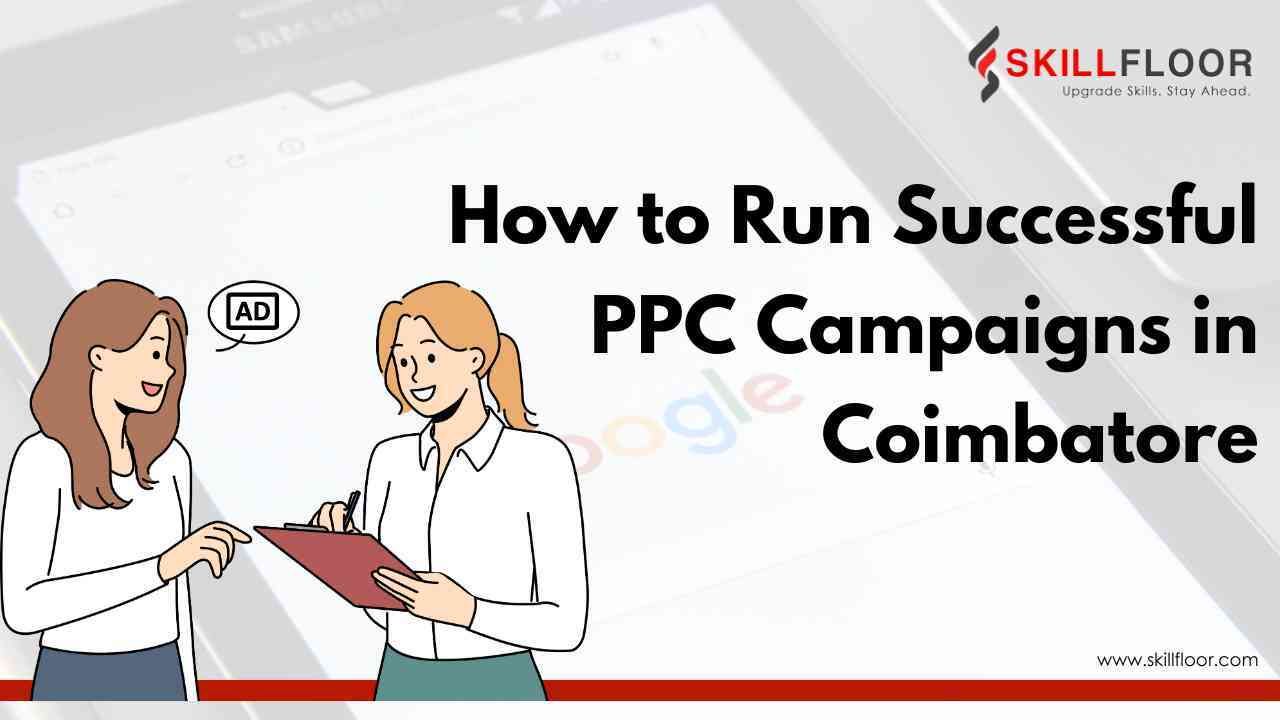Strategies for the Best Digital Marketing Results
Discover the top strategies for achieving the best digital marketing results. Learn effective tactics for SEO, PPC, content marketing, social media, and email marketing to boost your online presence and drive growth.

To achieve the Best Digital Marketing results, it's important to use a mix of strategies that align with your audience and business goals. Start with a clear content marketing plan that focuses on creating valuable and relevant content to attract and engage your audience. Use social media platforms to share your content and interact with your followers, keeping a consistent brand presence across all channels. Investing in search engine optimization (SEO) helps improve your website's visibility, driving organic traffic and enhancing your online presence. Additionally, email marketing campaigns are a great way to nurture leads and maintain customer relationships, leading to higher conversion rates.
Another effective strategy for achieving the Best Digital Marketing outcomes is leveraging data analytics to guide your decisions. By closely monitoring your digital marketing metrics, such as website traffic, engagement rates, and conversion rates, you can gain insights into what's working and what needs adjustment. This data-driven approach allows you to refine your strategies and optimize your campaigns for better performance. Additionally, consider using paid advertising, like pay-per-click (PPC) and social media ads, to reach a broader audience and drive immediate results. Integrating these strategies into your overall digital marketing plan ensures a well-rounded approach that can effectively grow your business and improve your online presence.
1. Develop a Comprehensive Content Marketing Strategy
Content marketing is a crucial part of any successful digital marketing strategy. High-quality, relevant content helps you connect with your audience, build trust, and establish authority in your industry. To develop a comprehensive content marketing plan:
-
Understand Your Audience: Conduct thorough research to understand your audience's needs, preferences, and pain points. This helps in creating content that resonates with them.
-
Create a Content Calendar: Plan your content ahead of time. A content calendar ensures consistency and helps you stay organized.
-
Leverage Various Content Formats: Use blogs, videos, infographics, podcasts, and social media posts to reach different segments of your audience.
-
Optimize for SEO: Ensure your content is optimized for search engines to increase visibility and drive organic traffic.
2. Invest in Search Engine Optimization (SEO)
SEO is essential for improving your website’s visibility on search engines like Google. Better visibility translates to more organic traffic and potential leads. Key SEO strategies include:
-
Keyword Research: Identify the keywords your target audience is searching for and incorporate them naturally into your content.
-
On-Page SEO: Optimize your website’s pages, including meta tags, headers, and images, to improve their search engine ranking.
-
Technical SEO: Ensure your website is technically sound, with fast loading times, mobile-friendliness, and a secure HTTPS protocol.
-
Backlink Building: Acquire high-quality backlinks from reputable websites to improve your domain authority and search engine ranking.
3. Utilize Social Media Marketing
Social media platforms are powerful tools for engaging with your audience and driving traffic to your website. To maximize your social media marketing efforts:
-
Choose the Right Platforms: Focus on the platforms where your target audience is most active. This could be Facebook, Instagram, LinkedIn, Twitter, or others.
-
Create Engaging Content: Share content that is informative, entertaining, and visually appealing to capture your audience’s attention.
-
Engage with Your Audience: Respond to comments, messages, and mentions promptly to build a strong relationship with your followers.
-
Analyze and Adjust: Use analytics tools to track the performance of your social media campaigns and make data-driven adjustments.
4. Implement Email Marketing Campaigns
Email marketing remains one of the most effective digital marketing strategies for nurturing leads and driving conversions. Here’s how to make the most of your email marketing efforts:
-
Build a Quality Email List: Use lead magnets like e-books, whitepapers, and free trials to attract subscribers.
-
Segment Your Audience: Divide your email list into segments based on demographics, interests, and behaviours to send targeted and relevant content.
-
Personalize Your Emails: Use personalization techniques, such as addressing subscribers by their name and sending tailored content based on their preferences.
-
Automate Your Campaigns: Use email marketing automation tools to send timely and consistent emails, including welcome series, drip campaigns, and re-engagement emails.
5. Utilize Pay-Per-Click (PPC) Advertising
PPC advertising allows you to reach your target audience quickly and drive traffic to your website. To get the best results from your PPC campaigns:
-
Choose the Right Platforms: Depending on your audience and goals, focus on platforms like Google Ads, Bing Ads, Facebook Ads, or LinkedIn Ads.
-
Conduct Keyword Research: Identify high-performing keywords and use them to create targeted ad campaigns.
-
Create Compelling Ad Copy: Write clear, concise, and persuasive ad copy that highlights the benefits of your products or services.
-
Optimize Landing Pages: Ensure your landing pages are relevant to the ad and designed to convert visitors into leads or customers.
-
Monitor and Adjust: Continuously track the performance of your PPC campaigns and make necessary adjustments to improve ROI.
6. Focus on Conversion Rate Optimization (CRO)
Driving traffic to your website is only half the battle; converting that traffic into leads or customers is the ultimate goal. Conversion Rate Optimization (CRO) involves:
-
Analyzing User Behavior: Use tools like Google Analytics, heatmaps, and user recordings to understand how visitors interact with your site.
-
A/B Testing: Test different elements of your website, such as headlines, images, and calls to action, to determine what works best.
-
Improving User Experience: Ensure your website is easy to navigate, visually appealing, and mobile-friendly to provide a seamless user experience.
-
Optimizing Calls-to-Action (CTAs): Create clear, compelling CTAs that guide visitors toward taking the desired action.
7. Explore the Power of Influencer Marketing
Influencer marketing can amplify your brand’s reach and credibility by leveraging the audience of popular influencers in your industry. To execute a successful influencer marketing campaign:
-
Identify the Right Influencers: Look for influencers whose audience aligns with your target market and who have genuine engagement.
-
Build Authentic Relationships: Approach influencers with a genuine interest in collaboration, rather than just seeking promotional opportunities.
-
Create Mutually Beneficial Content: Work with influencers to create content that benefits both parties and resonates with their audience.
-
Track and Measure Results: Use tracking tools to measure the impact of your influencer campaigns on brand awareness, engagement, and conversions.

What role does SEO play in digital marketing success?
One essential component of effective digital marketing is search engine optimization or SEO. It entails improving your content and website to appear higher in search engine rankings, which raises awareness and drives inbound links.
First off, SEO makes your website faster and easier to navigate, which enhances user experience. Higher conversion rates may result from visitors finding what they need fast and easily on a well-optimized website.
Second, SEO raises your website's search engine ranking, which increases organic traffic. Increased visibility and more clicks and traffic are associated with higher ranks on search engine results pages (SERPs).
Thirdly, SEO helps you gain your audience's confidence and credibility. Higher-ranking websites are frequently seen as more reliable and authoritative, which can improve the perception of your company.
The finest digital marketing outcomes come from well-planned plans, consistent execution, and continual optimization. You may build an effective digital marketing plan for your organization by focusing on content marketing, SEO, social media, email marketing, PPC advertising, CRO, influencer marketing, video marketing, a mobile-first approach, and data analysis. Stay agile, explore, and be prepared to adapt to the changing digital market.






























































